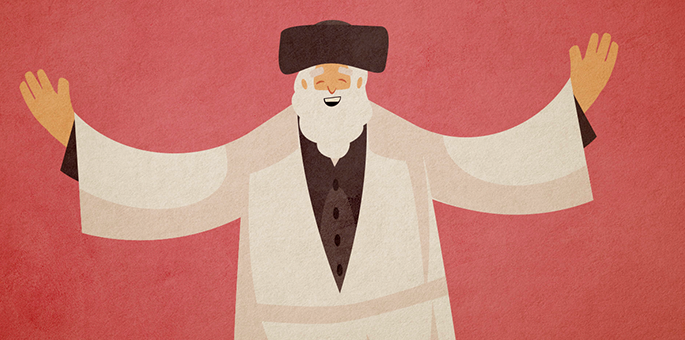By Asharon Baltazar Chabad.org
For the eight days of Passover, Rascov, a small community in what is now known as Transnistria, became a colorful epicenter of Jewish life as guests from the surrounding towns and villages descended upon it. From all strata of society, its visitors had come to absorb the marvelous Seder of Rabbi Yosef, son of the great Rabbi Shabtai. He sat at the table’s head, dressed in a brilliant white robe, his glowing face resembling that of an angel, and his wonderful presence filling every corner of the packed room.
The detail that perhaps stood out most in his guests’ minds was the fact that there were no seating arrangements. Whoever arrived first merited to sit by the Rebbe’s side, with no preference given to those guests of greater stature, and a common but unforgettable sight was a simple water-carrier sitting to Rabbi Yosef’s right and a woodchopper to his left. “All Your people are righteous,” Rabbi Yosef regularly said, “All come from Abraham, Isaac, and Jacob, and there’s no need to treat one as an inferior.”
The same went for the women, who filled a nearby chamber. There were no reserved seats closest to the Rebbetzin. Everyone sat together, one family, united.
Rabbi Yosef read the Haggadahin a loud, clear voice so that all present were able to hear him, and for the women and children sitting in the adjacent room with his Rebbetzin, he translated every line into Yiddish. He then followed with his novel explanation of the verse, either through a Kabbalistic lense or a homiletic one. Every word was uttered with holy conviction and fiery enthusiasm. After concluding the Seder, he began to chant the Songs of Songs and danced around the table, joined by his many guests.
“When Rabbi Yosef sings around the Seder table,” Rabbi Avraham Yehoshua Heshel of Opatow would say, “a Heavenly procession of angels immediately swoops into that room to learn how to praise their Creator. For in those moments, Rabbi Yosef’s soul ascends before the Creator Himself and arouses mercy for those who ask.”
For this reason, a follower of Rabbi Yosef was permanently present at the Seder for many years. He and his wife were childless, and the two persistently requested a blessing from Rabbi Yosef. Yet his answer was always the same: “Now is not the time.”
One year, the couple came to Rascov, their broken hearts buoyed by a sliver of hope. Night fell, and after the evening Passover prayers, the man found a spot behind Rabbi Yosef’s chair while his wife stood near the Rebbetzin in the adjacent room, which opened to the table’s head.
Following the Seder, Rabbi Yosef flipped to the Songs of Songs and started belting out the words in his special melody. His singing was mirrored by the crowd, the noise in the room slowly swelling to rapturous heights, as it seemed no one—not even the heavens and earth—was able to resist singing the praises of the Jewish People. When Rabbi Yosef reached the words, “What will you see for the Shulammite, as in the dance of the two camps,” he sprang to his feet and began to dance. Almost immediately, the guests found themselves joining hands—wealthy and poor, the simpletons and rabbis—circling around the old Rebbe.
One man avoided all the excited flurry, his spirit sodden with worry. He occasionally glanced at his wife, who stood in the other room, quietly watching the proceedings with tears streaming down her face. That afternoon, they had once again begged Rabbi Yosef to bless them with children, only to be turned away as usual.
The dancing finally stopped. Rabbi Yosef turned to sit back down, but found the sullen woman in his path, unable to contain her silent tears anymore.
“Rebbe!” she cried. “I swear that I won’t move from here until you command Heaven to bless me with a child!”
Her outburst caused the room to immediately fall quiet. Rabbi Yosef regarded her sadly, and with an overwhelming rush of shame, the woman realized what she had done.
But the slight frown on Rabbi Yosef’s face slowly melted, replaced by warm contentment. Rabbi Yosef raised his eyes heavenwards.
“Master of the Universe,” he said in a loud voice. “These are the words of our sages recorded in the Mishnah: ‘A glass of wine is poured for him, and the son asks [the Four Questions].’ Every Jew is required to fulfill this commandment, yet I, Yosef the son of Rabbi Shabtai, ask You: Why haven’t You granted this couple with a son of their own who can ask these four questions?
“Our sages are also recorded as saying, ‘And we distribute nuts for the children on the eve of Passover to arouse their curiosity.’ Why hasn’t this poor couple of Yours been granted the same opportunity?”
Rabbi Yosef swept the room with a look of intense triumph.
“Passover is a time of favor for the childless. Sarah, our matriarch, was barren, and our sages say that she had no uterus. Yet, Sarah gave birth on Passover, exactly one year after receiving news that she would bear a son. This is a time for mercy for those in need of children.”
As he finished speaking, Rabbi Yosef turned to the woman.
“I promise that you’ll be hugging your son next year. Return to your place.”
Indeed, the following year, the tzaddik’s blessing came true.
Asharon has liked to write since childhood and found a good outlet for his creativity here. He currently resides with his wife in Jerusalem, where he studies in Kollel. For suggestions, critique, or just a simple hello, you can contact him via his email.
Art by Rivka Korf Studio, a Miami-based art design studio run by Rivka Korf, a coffee lover and mother. Rivka uses her expertise and creativity to run a team that creates masterful compositions and illustrations for corporate and large nonprofit organizations.






